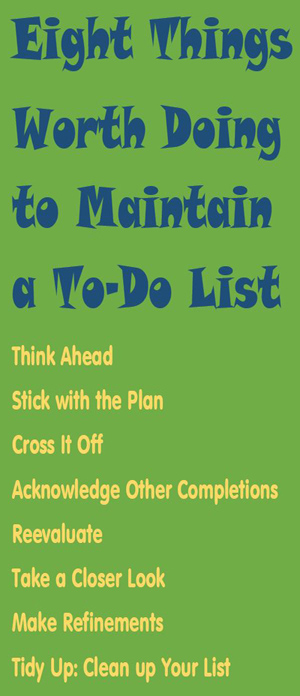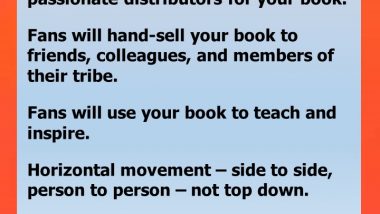Guest Post by Jeff Davidson
Any author worth his/her salt periodically grapples with the daily to-do list. To-do lists have been with us since the dawn of humankind and, today, everyone keeps one in some form or another. However, some authors are more effective at maintaining a to-do list and executing the items on the list.
Here are a number of dos and don’ts gleaned over the years from my observations on what makes a successful writing career.
Things Worth Doing to Maintain a To-Do List
1. Think Ahead: Draw up your list at the end of the day for the next day, or very early in the morning for the day that will unfold. This gives you the best opportunity, free from interruptions, to jot down those items that are current and vital.
2. Stick with the Plan: As much as possible, refrain from adding items to your to-do list to be handled during this same day. Sometimes, this is unavoidable, but as often as you can, stick with the items that you mapped out the night before or early in the morning.
3. Cross it Off: By all means, when you do finish a task like completing a chapter, joyfully cross it off your list. Reducing the number of items remaining on the list is a positive reinforcer that will help you continue on in productive ways.
4. Acknowledge Other Completions: If you happen to accomplish something during the day that wasn’t on your to-do list but was important, feel free to write it on the to-do list and then immediately cross it off. This might sound like extra work or a meaningless gesture, but countless writers have told me that they psychologically benefit from acknowledging completed tasks that might not have appeared on the list but needed to be handled.
5. Reevaluate: Once or twice throughout the day, perhaps mid to late-afternoon, reassess what’s on your list. Is it all still appropriate? Are some items better handled at another time because they do not merit your attention immediately?
6. Take a Closer Look: Continually monitor whether the items on your list need to be done at all. Sometimes situations take care of themselves. Sometimes you can automate tasks that previously required manual and individual attention. The key is to assess constantly whether a task needs to be done at all, and whether it needs to be done today.
7. Make Refinements: As the day comes to a close, hone and refine your list. What’s left over that needs to be addressed the next day? What needs to be added to the list and will merit your attention tomorrow? In other words, it’s okay now to heap on new tasks that you refrained from putting on today’s list.
8. Tidy Up: Clean up your list. Put the items in the order that you want to tackle them and make everything concise, and you’ll be on your path to improved productivity again tomorrow.
Things to Avoid in Constructing and Executing a To-Do List
1. Procrastinating on the Big Stuff: One of the biggest traps that authors fall into once they begin executing the items on their to-do list is postponing the item or items they know are the most important. They have it on the list for a reason, and they know they need to tackle that task right away, but the procrastination beast rears its ugly head and gets in the way of things.
Resolve, at the start of the day, that you will take the appropriate action to complete the task(s) you classified as important and meriting attention.
2. Being Afraid to Rethink: Being afraid to reevaluate your list periodically also ranks high on behaviors to avoid. Although it’s important to not pile on other stuff throughout the day, once you’ve got your list squared up, sometimes situations do merit a fundamental change in how you’re going to spend your time over the next couple hours. Sometimes the task is so compelling you have no choice, and so, to-do list or not, you plunge headlong into it.
3. Refusing to Shift Gears: From a strategic standpoint, when a significant change occurs in your external environment, such as when an editor calls and wants something done — something you thought was completely done gets thrown back in your lap — then you have to shift gears. What’s more difficult is recognizing when to shift gears simply because it makes sense, not just in an emergency situation. Don’t be afraid to shift gears when you need to, regardless of the external circumstances.
4. Ignoring Your Energy Level: When executing the items on your to-do list, it’s also important to pay attention to your own energy level. It would be wonderful to tackle the most important thing first, the second-most-important thing second, and so on.
Sometimes, however, your physical or mental energy is not all it needs to be as you approach the next item on the list. At that juncture, tackle anything that you can. Completing a small task at this point can provide the mental victory that will propel you on to a more difficult or involved task.
About Jeff Davidson
Jeff Davidson, the internationally recognized expert on work-life balance, holds the registered trademark as the Work-Life Balance Expert®. He is the author of several popular books including Breathing Space, Simpler Living, and The 60-Second Organizer. He is an Advisory Board Member on The Organized Executive, a monthly publication of Columbia Books.
In 2013, Jeff had eight books published in Chinese, including Simpler Living, The 60-Second Innovator, The 60-Second Organizer, The 60-Second Self-Starter, Ten-Minute Guide to Time Management, and Ten-Minute Guide to Project Management.
Jeff Davidson is on the web at http://www.BreathingSpace.com.
More from Jeff Davidson:
The Book Publishing Industry on the Rocks?
How to Cultivate a Celebrity Author Image
Jeff Davidson: The Amazon Book Reviewer with an Agenda
Jeff Davidson: Choosing an Article Topic
Jeff Davidson: 10 Tips for Becoming a Successful Mainstream Author
About John Kremer
John Kremer is author of 1001 Ways to Market Your Books, the Relationships Matter Marketing program, and many other books and reports on book marketing, Internet marketing, social media, and book publicity. -- John Kremer on Book Marketing.


